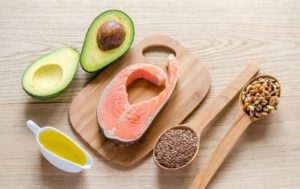In biochemistry and nutrition, monounsaturated fatty acids (abbreviated MUFAs, or more plainly monounsaturated fats) are fatty acids that have one double bond in the fatty acid chain with all of the remainder carbon atoms being single-bonded. By contrast, polyunsaturated fatty acids (PUFAs) have more than one double bond.
Contents
Uses
- Monounsaturated fats are found in natural foods such as red meat, whole milk products, nuts and high fat fruits such as olives and avocados. Olive oil is about 75% monounsaturated fat. The high oleic variety sunflower oil contains as much as 85% monounsaturated fat. Canola oil and Cashews are both about 58% monounsaturated fat. Tallow (beef fat) is about 50% monounsaturated fat and lard is about 40% monounsaturated fat. Other sources include avocado oil, macadamia nut oil, grapeseed oil, groundnut oil (peanut oil), sesame oil, corn oil, popcorn, whole grain wheat, cereal, oatmeal, almond oil, sunflower oil, hemp oil, and tea-oil Camellia.
Benefits
- Protects Against Heart Disease: The most well-documented benefit of consuming monounsaturated fats is the potential for keeping your heart healthy, especially in terms of replacing high levels of saturated fats with MUFAs. Consuming higher levels of MUFAs than saturated fats has a protective effect against metabolic syndrome, a cluster of disorders that increase a person’s risk for cardiovascular disease
- Improves Insulin Sensitivity and Helps Your Body Use Its Fat Properly: Another contributing factor to the declining health of much of the Western world is the prevalence of insulin resistance. Considered a very common condition, insulin resistance affects over 3 million people in the U.S. every year. It impacts equally across age groups after the age of 18 and is marked by the body’s inability to process and release insulin at correct levels. This causes glucose to build up in your bloodstream and often leads to type II diabetes.
- Helps You Lose Weight: Diets high in MUFAs aren’t only helpful regarding weight loss because of their impact on adipose dysfunction. They’ve also been proven to help patients with elevated levels of certain liver enzymes (a precursor to liver disease) decrease weight, waist circumference and cholesterol, along with other obesity-related factors.
- Improves Your Mood: Are you feeling better yet? Good. Because eating more monounsaturated fats is even good for your mood. Replacing saturated fats with monounsaturated fats in your diet can reduce anger levels as well as increase your daily physical activity and resting energy expenditure, meaning you burn more calories while at rest.
- Strengthens Your Bones: Monounsaturated fats also allow your bones to absorb calcium efficiently, leading to denser bones and less occurrence of brittle bones and conditions like osteoporosis. Conversely, diets high in saturated fats and low in unsaturated fats are associated with lower bone density and reduced calcium absorption.
- Reduces Cancer Risks: For decades, experts have debated the impact of high-fat diets on the risk of cancer. While some research has been inconclusive, a lot of recent material supports the hypothesis that diets high in fat, especially unsaturated fats, lend themselves to a reduced risk of certain cancers. Thus, foods high in MUFAs are potential cancer-fighting foods.
Cautions
- n/a
Interactions
- Unknown, please consult with your doctor.
Other names
MUFAs
References
Source: Wikipedia, https://en.wikipedia.org/wiki/Monounsaturated_fat
Draxe.com, https://draxe.com/monounsaturated-fat/
Image source: http://www.health.harvard.edu/staying-healthy/the-truth-about-fats-bad-and-good

